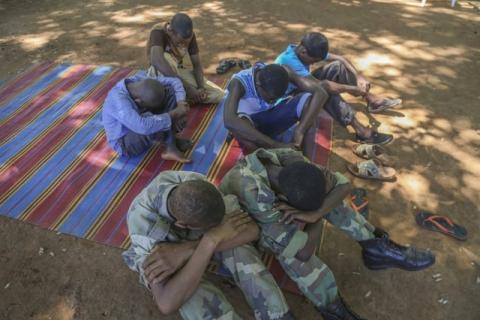Advertisement
Freeing child soldiers in Central African Republic: 'They have been through hell'
DAKAR (Reuters) - Benoit Daoundo is a child protection officer who works for the United Nations children's agency (UNICEF) to help release children from armed groups in Central African Republic.
"Nothing could have prepared me for my role as a child protection officer in Central African Republic.
My home country, Benin, has never been at war and I had never seen children associated with armed groups before.
But working with kids had always been my dream. Back home I trained as a social worker and worked with vulnerable children in Benin and local and international NGOs before joining UNICEF.
My family were concerned for me, and a few weeks after I arrived in Central African Republic, violence erupted.
We have been living in our office since June 2014 - rolling our small mattresses under our desks in the morning. Constant and unpredictable insecurity prevents us from living in town.
My first success in releasing children from armed groups started with a very scary meeting outside Bambari in July 2014.
I had been called by the "general" in charge of one of the anti-balaka (militia) groups, and told to come at dawn, with a local aid worker, to discuss the fate of the children.
After a few minutes sitting outside the base in the bush, we realized that the whole group had silently surrounded us - hundreds of fighters in traditional attire, motionless, many of them children who were carrying weapons.
I asked the commander what was happening and he replied that it was for my safety, but I understood that it was over for us.
I explained how important it was for us to educate people about the negative impacts of having children in armed groups.
In short, I talked a lot before he understood this, insisted that I wasn't going to be harmed and realized I hadn't come to carry out investigations for the International Criminal Court.
I must confess that I was covered in sweat that day.
BACK TO SCHOOL
"The most rewarding part of my job is probably when I check on the children that have been released from armed groups.
Those children have been through hell, they have seen or done things that no human being should ever have to witness - so reintegrating them into a normal life is always a challenge.
How do you become a normal kid when you have been forced to desecrate the body of your enemy? But there are success stories.
Nothing makes me prouder than seeing them go back to school or, for the older ones, successfully starting a small business.
From time to time, I get a phone call from Ibrahim, a 17-year-old from Cameroon who we helped reunite with his family.
When Ibrahim was released, reuniting him with his family took several months, as he had no ID or birth certificate, and the insecurity made the cross-border reunification even harder.
Just one month after joining his family, Ibrahim called me to say thank you, he told me he was back in school and happy. And he has kept this habit of calling every time something significant happens in his life – mostly good grades at school.
CONVINCING COMMANDERS
"When we first started talking to the local commanders, they could not understand why it was wrong to recruit a child.
They simply said children should be allowed to seek revenge when their family had been killed, or their villages destroyed.
Over the past months, they have understood that children should be kept out of the groups. Of course, there are still thousands of children associated with the armed groups.
We are still pushing to release them, although we know the most challenging part of the process is giving those children a healthy and sustainable future once they have been released.
This is a long process, that we will continue in the months, and probably years, to come. I just hope the country will find lasting peace, so these children can have a chance to build a future for themselves."
(Editing by Kieran Guilbert and Katie Nguyen)



















Add new comment